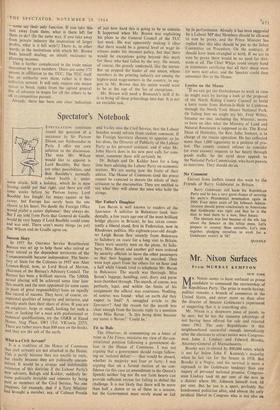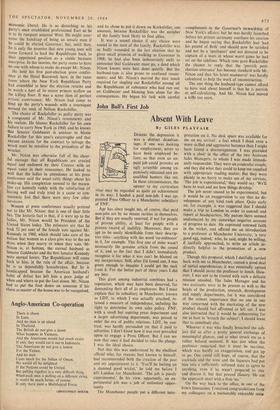Mr. Nixon Surfaces
From MURRAY KEMPTON
MR. NIXON seems to have surfaced as prime candidate to command the receivership of the Republican Party. The prize is worth having; politics remains a branch of commerce in the United States, and never more so than after the disaster of Senator Goldwater's experiment at suggesting that it is something else.
Mr. Nixon is a shopworn piece of goods, to be sure; but he has the immense advantage of not having been offered for sale and rejected since 1962. The only Republicans in this neighbourhood successful enough immediately after the elections to attract notice were Congress- man John J. Lindsay and Edward Brooke, Attorney-General of Massachusetts.
Brooke was re-elected by 800,000 votes, which is not far below John F. Kennedy's majority, when he last ran for the Senate in 1958. But Brooke is a Negro, and his survival is more a reproach to the Goldwater tendency than any . augury of personal national promise. Congress- man Lindsay took 66 per cent of the vote in a district where Mr. Johnson himself took 68 per cent. But he too is a sport, probably the handsomest politician alive, and almost the only juridical liberal in Congress who is not also an economic liberal. He is as disturbing to his party's once established professional East as he IS to its rampant amateur West. He might over- come the handicap of being an unsafe man if he could be elected Governor; but, until then, he is only the promise that new young men will come forward to lead the Republicans back to their. appointed position as a viable business enterprise. In the interim, the party seems to have no one with whom to make do except Mr. Nixon.
He held his first post-election press confer- ence at the Hotel Roosevelt here, in the same room where the New York Republican Party had assembled to hear the election returns and to watch a host of its minor princes wallow on the killing floor. It was a scene then of perfect artistic contrivance; Mr. Nixon had come to bind up the party's wounds with a tourniquet around the neck of Nelson Rockefeller.
The choice of Rockefeller as guilty party was a compound of Mr. Nixon's resentments and his realism. He blames Rockefeller for his own failure to carry New York in 1960, and he knows that Senator Goldwater is anxious to blame Rockefeller for this year's catastrophe and that anyone anxious for the contract to salvage the Wreck must be sensitive to the prejudices of the wrecker.
Mr. Nixon was otherwise full of the cheer- ful message that all Republicans are created equal and endowed by their Creator with an equal voice in their renascence. He looked so well that the ladies in attendance at his press conference said the usual catty things about his make-up. His complexion seemed to the mascu- line eye honestly ruddy with the satisfaction of having well and truly tried in a cause so con- veniently lost that there were very few other survivors.
Women at press conferences usually pretend not to like Mr. Nixon; that is one of their little lies. The historic fact is that, if it were up to the ladies, Mr. Nixon Would be President of the United States today. The estimates are that he took 52 per cent of the female vote against Mr. Kennedy in 1960, which should take care of the notion that women as a class give way to the sex drive when they marry or when they vote. 'Mr Nixon is, it bottom, the eternal husband as Senator Goldwater and the first Senator Kennedy Were eternal lovers. The Republicans will come back to him, in the ruin of the affair, because he is so dependably housebroken. But he is handicapped because the American husband's habit of defeat has left him a poor judge of When and where to put the foot down. Mr. Nixon had to put the foot down on someone if his claim as master of the house was to be recognised,
and he chose to put it down on Rockefeller, one assumes, because Rockefeller was the member of the family least likely to find allies.
It was a sound choice if any choice were sound in the state of the family. Rockefeller was so badly wounded in the last election that he gives small promise of walking as Governor in 1968; he had also been indecorously swift to announce that Goldwater must go, a deed which Nixon knows were best done quietly. But the husband-type is also prone to confused resent- ments; and Mr. Nixon's marred the nice touch required for singling out Rockefeller among all the Republicans of substance who had run out on Goldwater and blaming him alone for the consequences. He began his task with careful
compliments to the Governor's stewardship of New York's affairs; but he was hardly launched before his private acrimony overbore his caution and he began saying that Rockefeller had 'had his pound of flesh' and should now be satisfied and not be a 'spoilsport' and not demand to be captain of a team in whose worst game he had sat on the sidelines. Which tone gave Rockefeller the chance to reply that the 'peevish post- election utterance' has become standard with Mr. Nixon and that 'his latest manceuvre' was hardly calculated to help the work of reconstruction.
The one thing the husband-type cannot afford to have said about himself is that he is peevish or self-calculating. And Mr. Nixon had moved a trifle too soon.



































 Previous page
Previous page